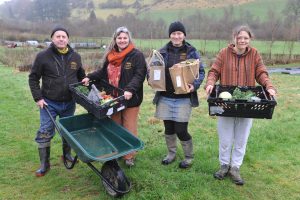GEORGE EUSTICE has all the qualifications to be DEFRA Secretary of State in the Westminster Government.
He owns a pair of green wellingtons, corduroy trousers, a smart tweed jacket and a wax jacket.
He must be very good at his job. He’s been a Minister in DEFRA for most of the last six years.
CAR CRASH INTERVIEW
Which makes his catastrophically ignorant performance on Sunday’s Andrew Marr programme all the more baffling.
After six years as a Government minister, four of which have come after the result of the 2016 Referendum and ten months of which have come after Boris Johnson ‘got Brexit done’, Mr Eustice appears to have little or no grasp of the realities of agricultural production and food processing.
His nonsensical remarks about sheep farming – which he has sought to clarity – have received a lot of attention.
Of equally worthy attention is how George Eustice regards the interaction between markets.
In Eustice World ™, tariffs will have no effect on the UK’s dairy industry because tariffs will also be applied to EU goods coming into the UK. Which would be an interesting take if in the last reported year the UK didn’t operate a surplus of dairy trade with the EU. In short, EU countries buy more of ours than we do of theirs.
No doubt the gap in exports will be taken up by exporting blue cheese to the notoriously lactose-intolerant population of Japan.
ARLA RESPOND WITH HUMOUR
As an illustration of the Eustice Doctrine the DEFRA Secretary claimed that if producers like Arla wanted to continue to trade in the UK, they would have to relocate their production of Lurpak to the UK.
Arla explained in a subsequent tweet, doubtless to George Eustice’s amazement after only six years in DEFRA, Lurpak is subject to legal origin protections. Those mean that Arla can only produce Lurpak® in Denmark with Danish milk. It can’t be produced in the UK.
Arla helpfully added: “Don’t panic, whatever happens with Brexit, we’re sure we’ll be able to find a way to keep Lurpak coming into the UK.”
Dairy production was only a small part of George Eustice’s monumental achievements during his interview.
He went on to anger sheep farmers with a crass assertion so wrong-headed that even his subsequent attempted gloss on his words rubbed salt into their wounds.
FEELING THE HEAT OVER SHEEP MEAT
Andrew Marr asked George Eustice about the effect on sheep farmers. In a no-deal Brexit, red meat exporters face tariff barriers to trade with their largest export market. Over 40% of sheep meat is exported to the EU and that accounts for 90% of all UK sheepmeat exports. The largest market for British sheep meat in the EU is France, which takes around half of all exports.
In the event of a no-deal Brexit, the tariffs on lamb exports would make UK production uncompetitive in the EU market. Worse, the prospect of a trade deal with New Zealand raises the dual prospect of imports carving UK farmersout of their home markets.
Mr Eustice blithely asserted that UK sheep farmers would face only short term price drops and farmers who farmed sheep and cattle together could diversify into beef as imports from Ireland and the EU would fall due to increased tariffs affecting imports to the UK.
He subsequently clarified: “In my comments on the Andrew Marr Show, I did not say that all sheep farmers should diversify into beef. I said that if tariffs were applied then some mixed beef and sheep enterprises might choose to diversify more into beef because Irish beef would become subject to tariffs, creating new opportunities for British producers.”
That is not what Mr Eustice said. He said mixed cattle and sheep farms could diversify.
Mr Eustice’s suggestion would only have force if he thought most sheep farmers farmed cattle. Otherwise, his answer on sheep tariffs would make no sense in context.
On the latter point, farming organisations expressed dismay and bemusement at Mr Eustice’s ignorance.
FARMERS RESPOND TO USELESS DISPLAY
Phil Stocker, CEO of the National Sheep said: “Mr Eustice’s comments will have angered many of our nation’s sheep farmers, failing to identify the unique and varied nature of sheep enterprises across the country.
“To begin with, to suggest that many of our sheep farmers are mixed farmers is wrong. This assumption will enrage sheep farmers across the UK who have structured their farms to focus on sheep, and it will particularly antagonise our devolved nations where the landscape includes more remote areas of countryside, especially suited to sheep, and where buildings, machinery and farminfrastructure simply would not suit a sudden switch to cattle farming.
“The fact we have many sheep farmers, especially younger farmers and new entrants to the sector who run their sheep on arable farms and on short term grass lets was completely ignored – simply switching to cattle would be impossible for them.
“I find it hard to think that George Eustice really believes what he said This interview leaves us thinking his comments could either be part of creating a ‘we don’t care’ attitude to bolster trade negotiations, or, and this would be highly concerning, it exposes an underlying willingness to see our sheep industry go through a restructure to reduce its size, scale and diversity.”
FUW President Glyn Roberts said: “The reality is that failure to reach a trade deal would have a catastrophic impact for our key agricultural sectors that would hit home very quickly, with the sheep industry likely to feel the impact most acutely.
“It would also cause untold disruption to food and other supply chains and complete anarchy at our ports.”
Mr Roberts said that such a failure would also have devastating impacts for EU businesses and that it was therefore in both the EU and UK’s interest to ‘pull out all the stops’ to reach a deal.
Mr Roberts also rebuffed claims by Prime Minister Boris Johnson that the UK ‘will prosper’ without an EU trade deal.
“You cannot cut yourself off from the worlds biggest economy and trading block in the height of a global pandemic, the worst recession for a century and having borrowed a quarter of a trillion to cope and think it’s going to go well.
“Not only would this amount to catastrophic self -harm from an economic point of view, but also at a practical level the country is woefully unprepared to cope with the flow of goods over our borders and all the paperwork and checks that this requires.”
Mr Roberts said that while EU ports facing the UK had undertaken significant changes to prepare for different Brexit scenarios, many UK ports were still in the early stages of planning new infrastructure and would not be prepared to cope with the movement of goods until at least July next year.
“Even if a deal is reached, we are facing significant additional costs and disruption as a result of non-tariff barriers due to the UK’s decision to leave the Single Market and customs union.
“A no-deal will severely escalate these and must be avoided at all costs,” he added.
NFU Cymru President John Davies said: “Ahead of the EU Referendum and ever since, NFU Cymru has been consistent in its messaging that a ‘No deal’ Brexit outcome, which would see the UK trading with the EU on WTO terms, would be a catastrophic position for Welsh farming. The reason for our strong position is that the EU market has been – and remains – the nearest, largest and most lucrative export market for many Welsh products. It is a marketplace where our customers recognise and value the Welsh brand and the high standards it represents.
“Only a year ago the industry was told that the odds of a ‘No deal’ Brexit were ‘a million to one against’ and there was an ‘oven-ready deal’, yet here we are only weeks before the end of the transition period, facing the prospect of ‘No deal’ and high tariffs on our exports.
“The comments made by Secretary of State George Eustice serve to further underline why it is so important to Welsh agriculture that UK Government agrees on a deal that secures access to the EU without tariff barriers and with minimal friction.
“The Secretary of State’s view that Welsh sheep farmers could diversify into beef production to offset the impact of a ‘non-negotiated outcome’ will be of major concern to our sheep farmers, who are some of the most efficient and innovative in the world producing a quality product. The reality is that changing production methods involves long-term production cycles and for many, the significant investment required makes it an unviable option.
“The Minister’s comments on the dairy sector are also concerning and do not account for the fact that we are net exporters of some dairy commodities and that the profitability of some domestic sectors, like liquid milk, is tied closely to the timely export of high-value co-products to the EU, like cream. The idea that many of the major EU dairy processors will have to relocate their operations to the UK is fraught with difficulties and is, in many cases, unviable.
“Being priced out of our nearest and most important export markets for even a short amount of time would have severe consequences for the food and farming sector in Wales.”
TFA National Chair Mark Coulman said: “To suggest that dairy farmers will be saved by forcing Arla to produce its popular Lurpak brand in the UK when it is legally bound to keep its production in Denmark and that dedicated and successful sheep farmers should consider diversifying into beef production, if export markets for our high-quality lamb become closed to us, were not helpful, to say the least. The farming community was hoping for much better than this.
“Somehow, we need to use the short time available to garner the strength to pull victory from the jaws of defeat. This will require a concerted effort with the Government and the farming industry working together to achieve that. Although late in the day, the TFA is committed to engaging in that work,” Mr Coulman concluded.
















Add Comment